This is going to be the article I once searched for when I wanted to know more about the quitting alcohol timeline, what I could expect in terms of withdrawal, and what steps I could take to begin the process of body repair after stopping drinking.
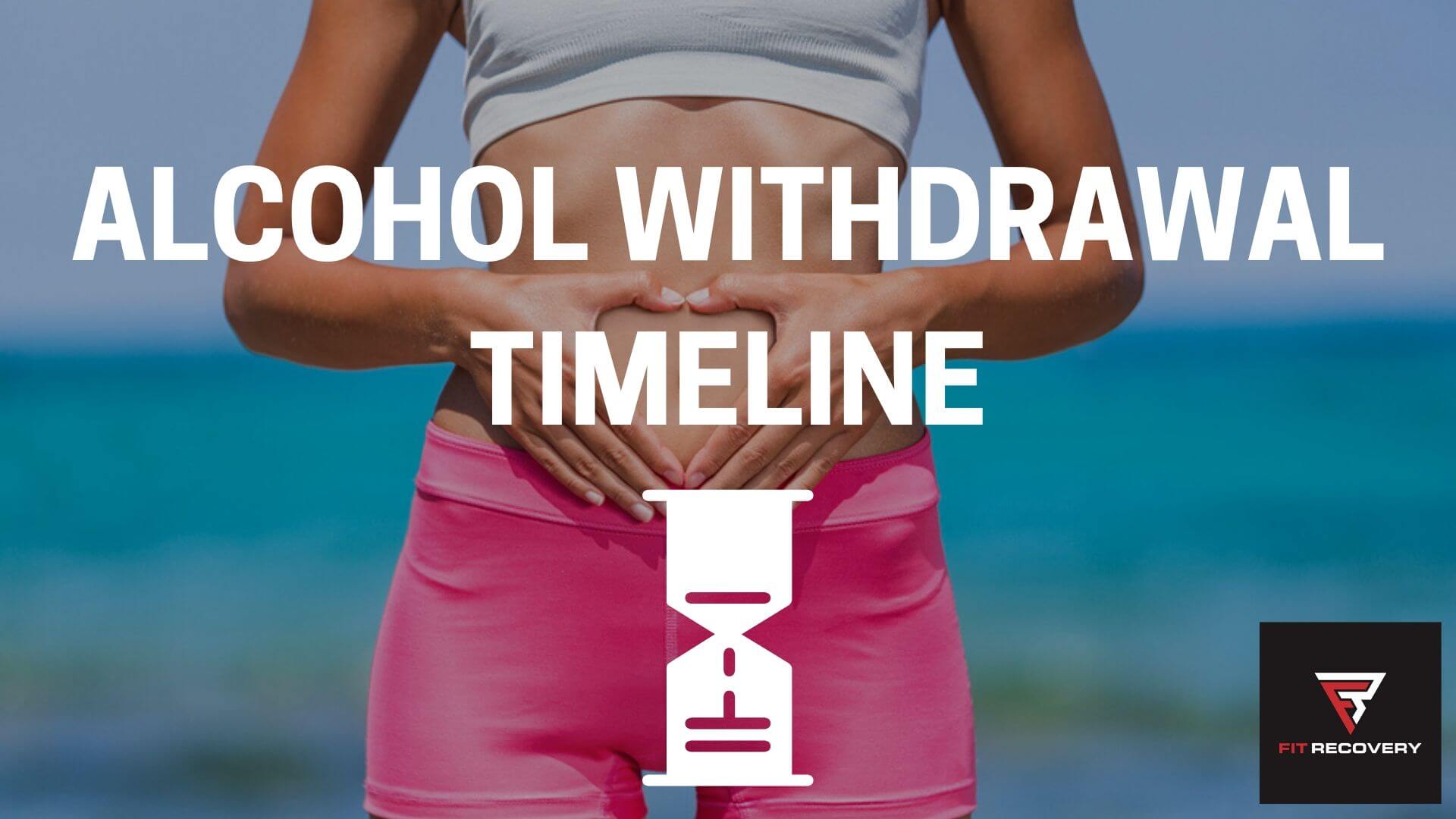
I would alternate between my bed and my couch, trying to distract myself from the shakes, nausea, and cold sweats. How long would these miserable symptoms last? I read some articles that said the withdrawal timeline only lasted for three days, and others that told me that my symptoms would last for months.
I was beyond frustrated because I didn’t just want to know how long my symptoms would last. I wanted to know if there was anything I could do to actively manage them. Ultimately, I wanted to know how to build my health back from scratch.
That was years ago, and I’ve spent a lot of time compiling the answers to these questions for anyone who happens to find themselves in my former shoes.
We will begin with some dark (and complex) subjects. But we will proceed all the way to the light at the end of the tunnel. Understanding your condition is a crucial first step towards beating alcoholism forever.
Quitting Drinking Timeline Withdrawal
While some people who are psychologically dependent on alcohol experience no withdrawal symptoms, most alcoholics experience withdrawal symptoms within 24 hours after they cease drinking. I will describe the mild, moderate, and severe quitting drinking timeline withdrawal.
I will then address the following topics:
- Why alcohol withdrawal symptoms occur
- Why repeated episodes of withdrawal get worse
- How to ease alcohol withdrawal symptoms
- How to prevent post-acute withdrawal syndrome (PAWS)
- How to restore male vitality after quitting drinking
- How to use pride as a weapon against relapse
It’s important to note that, because we are all biochemically different, not everyone has the same symptoms or withdrawal timelines. Moreover, both the symptoms and timeline depend on the severity of dependence.
With that said, the following chart is a general snapshot of the withdrawal timeline. In the following sections I will clarify and expand upon this timeline.
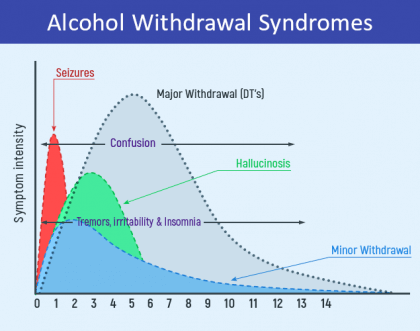
Mild Withdrawal
Mild withdrawal symptoms feel like exaggerated (and extended) hangover symptoms. About eight hours after the last drink, you may feel:
- A general sense of unease
- Trouble sleeping
- Shaky hands
- Mild sweating
- Confusion
- Stomach discomfort
- Fatigue
- Mild depression
- Symptoms generally peak and go away within 24 hours
A person who suffers from mild withdrawal symptoms and escalates their drinking is likely to experience moderate withdrawal symptoms in the future.
Moderate Withdrawal
Moderate withdrawal symptoms can include any of the above, with the addition of a few others that can make you feel like you’re on the verge of losing your mind:
- Increased blood pressure
- Increased sweating
- Heightened anxiety
- Mood swings
- A very real sense of impending doom
- Hypersensitive reflex responses
- Agitation
- Symptoms generally peak and taper off within 48 hours
Cravings, anxiety, and/or depression can continue for weeks if they are not addressed with support, drugs, or nutritional supplementation.
A person with moderate withdrawal symptoms who continues to drink will increase the likelihood of experiencing severe withdrawal symptoms in the future.
Severe Withdrawal
People who are severely dependent on alcohol have often been drinking large amounts daily for many months or years. Terminating alcohol can produce symptoms only a few hours after the last drink.
Severely dependent people who stopped cold turkey can expect to experience:
- High fever
- Uncontrollable negative thoughts
- Nightmares while half-asleep
- Brain zaps
- Full body twitching
- Visual, auditory, and/or tactile hallucinations
- Full body seizures, usually within 1-2 days of the last drink
- Delirium Tremens – confusion/hallucinations that can last up to a week (untreated)
(Before I quit drinking, I unwisely decided to try to stop cold turkey. I couldn’t believe that I had downed an entire handle of vodka the night before, and so I took the day off of work and decided to tough it out. I experienced every symptom on the list above except for seizures. I downed an entire bottle of bitters in order to end the madness. I had to keep drinking until I sought professional help.)
People with severe withdrawal symptoms are likely to experience psychological difficulties for months afterward. I fell into this category.
If you have any symptoms of severe withdrawal, you are experiencing a medical emergency that can be fatal. Consult a doctor immediately. He or she will likely prescribe a benzodiazepine that will calm down your hyperactive brain, prevent seizures and help to restore normal blood pressure. You may be required to detox under medical supervision.
There are fine lines and gray areas between each of these three stages of dependence and associated withdrawal symptoms. It’s best to use an honest assessment about how much and how long you’ve been drinking to determine the stage of your symptoms.
What Causes Withdrawal?
Alcohol is a depressant that mimics GABA, which is the primary “inhibitory” or calming neurotransmitter in our brains. The alcoholic brain decreases its long-term GABA production because it has learned to rely on alcohol for the same effect.
To make matters worse, liquor suppresses glutamate, which is an “excitatory” neurotransmitter. Glutamate has the opposite effect as GABA, making our brains hyperactive and our experience of the world hypersensitive.
When an alcoholic stops drinking suddenly, two important things happen:
- Glutamate rebounds to high levels within 3-8 hours
- GABA does not return to normal levels (this can take weeks)
Many of the symptoms above are caused by a lack of GABA and an excess of glutamate.
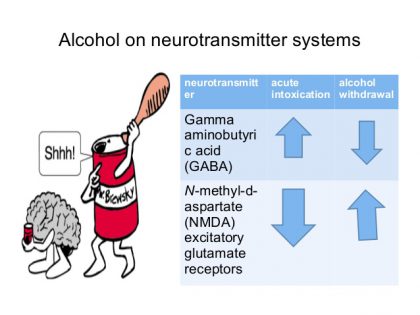
Alcoholism is a complex condition, and many other biochemical processes are involved in quitting alcohol timeline withdrawal symptoms. But in case you’ve been suspecting that you’re doomed or you’re losing your mind, it can be very helpful to be aware of the GABA/glutamate mechanism.
The following graphic may help you to grasp a fuller picture of the biochemistry involved:
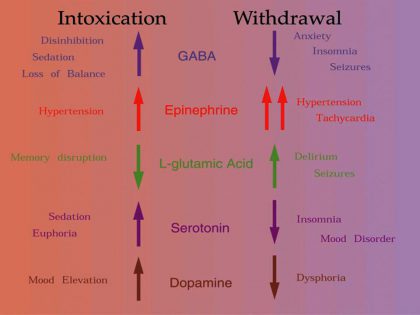
Alcoholism is not a sinister curse; it is a biochemical disorder that can be conquered.
Why Do Repeated Withdrawal Episodes Get Worse?
Kindling is a phenomenon of brain chemistry for alcoholics. It basically means that episodes of withdrawal tend to get worse over time.
Due to kindling, I’ve experienced almost every symptom listed in all of the stages of withdrawal above.
In high school, I had a few scattered hangovers. These progressed to mild withdrawal symptoms when my tolerance increased in college. By the time I finished college, I experienced moderate symptoms if I went a few days without drinking.
In my mid-twenties, I could not take a week off of drinking without suffering some gray area between moderate and severe withdrawal symptoms. I had to call in sick to work whenever I wanted a “dry period” to begin. Eventually, my symptoms got so severe that I was left with no option but to get help.
The worsening of symptoms from episode to episode baffled me. Why couldn’t I go back to having simple hangovers or mild withdrawal symptoms?
The answer is that I had progressively greased the pathways of withdrawal in my own brain. With each alternating period of drinking, withdrawal, and dry time, my brain’s compensatory manipulation of GABA and glutamate became more exacerbated.
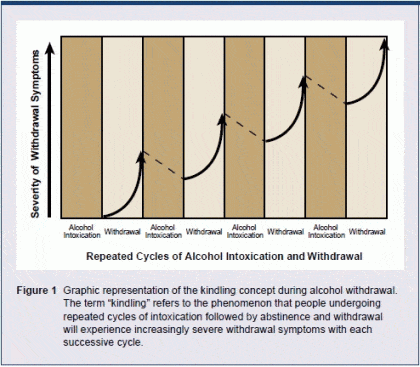
Moreover, scientists have found that each withdrawal experience permanently alters specific processes within our brains. (It is not necessary to understand these processes to grasp the concept of kindling.)
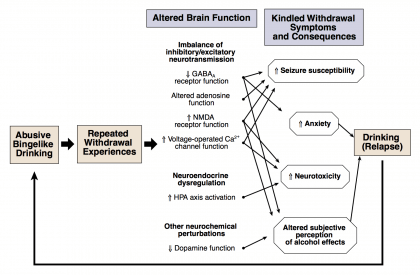
Studies in primates have found that animals with past withdrawal episodes suffered from more extreme symptoms in later episodes, even when they were given less alcohol than they had consumed in the past. (source)
Yet the average heavy drinker doesn’t decrease the amount consumed over time. It’s no secret that alcoholics build a frighteningly high tolerance. This fact also adds to the severity of future withdrawal episodes.
So, why do alcoholics tend to escalate their drinking over time? One reason they drink more is because more alcohol is needed to fill in for GABA, which becomes ever more scarce in their brains. Additionally, more is needed to suppress glutamate, which as mentioned before, causes feelings of stress that set in a few hours after drinking sessions end.

And so the alcoholic begins drinking more during each session and waiting less time in between sessions. Withdrawal episodes can go from “mild” to “severe” within the span of a few months. There are a few other reasons that withdrawal can get worse over time:
- Longer duration of drinking causes more brain and organ damage (detox becomes more physically difficult)
- Psychological dependence increases along with physical dependence (quitting becomes more mentally difficult)
It’s not uncommon for an alcoholic who swore never to drink in the morning to reluctantly begin taking a shot or two to ease withdrawal symptoms before work. It seems like a blur in retrospect, but luckily after reaching this point, I decided that it was time to let go of my pride and get help.
Remedies For Withdrawal
Since alcoholism is a biochemical disorder, there are a number of biochemical remedies that can help alleviate your symptoms and begin the process of body repair after terminating drinking.
- Anti-seizure drugs
- Vitamins
- Minerals
- Amino Acids
- Omega-3 Fatty Acids
- Herbs
To learn about how the above can help you feel better during or after withdrawal, be sure to read these two articles:
Since I previously discussed the role of GABA in withdrawal, I should note that GABA can be taken in oral form. Some people may be helped by this supplement, but studies have not shown that it’s effective at crossing the blood-brain barrier. (source) I have never felt any effect from taking GABA supplements. If a GABA supplement comes out that changes my mind, I will write about it.
Properly managing withdrawal symptoms will drastically improve your quality of life and, as a result, your odds of avoiding relapse.
Severe withdrawal symptoms should be monitored by medical professionals. For mild or moderate withdrawal symptoms, you may be able to detox at home. Beyond supplementation, here are some tips based on my past experiences with home detox:
- To help detoxify your body and relax your nervous system, take a hot epsom salt bath
- Take a contrast shower, in which you alternate between hot and cooler water
- Do light exercise once per day to break a sweat and release endorphins
- Drink plenty of water and try to eat the highest quality foods, especially fruit and vegetables
- Tell someone about what you’re going through in case your symptoms worsen
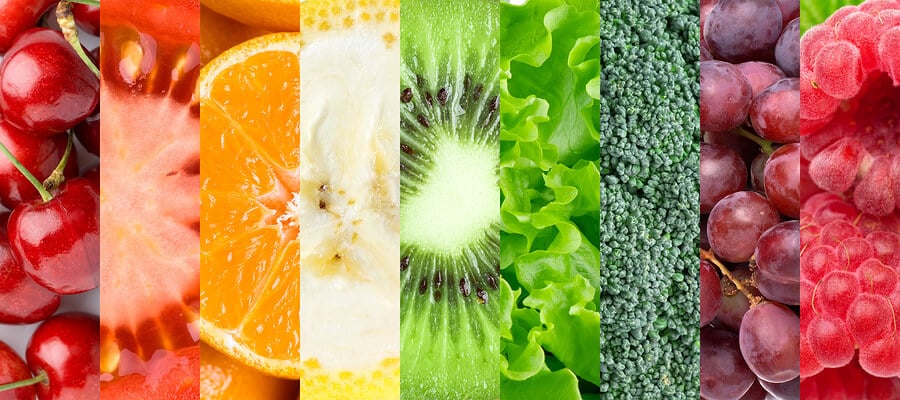
Years ago, I successfully used epsom salt baths, contrast showers, diet changes and exercise to begin dry periods that would last a week or two.
But I never read anything about the biochemistry of alcohol tolerance, kindling, or the withdrawal timeline. As a result, I would inevitably drink again at a party. After a week or two of summoning all of my willpower to drink “socially,” I’d still end up with worse withdrawal symptoms than I’d had before.
If you want to delve deeper into the quitting alcohol timeline, including all of the stages of withdrawal, see my YouTube video below:
Preventing Post Acute Withdrawal Syndrome (PAWS)
Once you reach the end of your particular withdrawal timeline, you will have finished detoxing. You should congratulate yourself. The strategies listed above will continue to help you feel human again if you’ve been drinking for a long time. Beating alcoholism is now within your power.
If your withdrawal symptoms were mild, pause to realize that you’re ahead of the curve. These symptoms don’t disappear or get better if you repeat them in the future. I wish someone had told me about kindling before I decided to drink and withdraw, again and again.
The next step is to fully repair your body and brain so that you can feel as good all the time as you thought alcohol would make you feel.
It can be done, and I’m living proof. The teetotal lifestyle is extraordinary.
With the right nutritional and lifestyle strategies, you can minimize the symptoms of post-acute withdrawal syndrome (PAWS). This condition affects a majority of alcoholics because brain chemical balance does not return automatically once drinking stops.
Anxiety, depression, insomnia, and cravings are the most common symptoms of PAWS. Here are some things you can do to address them:
- Diet: In a nutshell – Avoid sugar highs and crashes (these can extend cravings), eat protein to rebuild your cells, complex carbs for energy, plenty of good fats for brain repair, and more fresh produce (for fiber, natural antioxidants, flavonoids, and polyphenols). A majority of recovering alcoholics are hypoglycemic and don’t even know it! You can read more about the importance of diet for recovery in my article on alcoholism and hypoglycemia.
- Exercise: Physical activity helps to restore endorphins, serotonin, dopamine, and brain-derived neurotrophic factor (BDNF), which literally rewires and repairs the brain. You can read more about the HUGE benefits of exercise in my article on exercise and addiction recovery.
- Supplementation: Take supplements that work to alleviate your individual symptoms. Unlike some prescription medicines that cause dependence, you don’t have to take them forever. Some supplements that I take to this day for maintenance (I’m in my fifth year sober) include a powerful multivitamin system, magnesium citrate, and adaptogens like reishi mushroom and ashwagandha.
- Meditation: It’s been proven that brief periods of meditation alter the brain and help people to self-regulate their emotions and behavior (source). I’ve had great success with yoga, which for me always feels like a synthesis of meditation and exercise. You can read more about how to integrate simple yoga poses into your daily routine in my article on the mind-body connection.
- Deep breathing: This is similar to meditation, but simpler: Studies show that taking a few moments out of your day to hold deep breaths can alter your brain and calm you down (source). If you’re like me and you’re prone to getting worked up about news and world events, check out my article on taking a break from cyber-stress.
If you check off all five of these categories, you have no reason to worry about those gloomy relapse statistics. You’ll be well on your way to repairing your body and rewiring your brain!
Body Repair For Men
Alcohol inhibits testosterone production severely. If you’re a man, this situation can and should be reversed as quickly as possible. Testosterone is a powerful natural antidepressant and maintaining high levels goes a long way in ensuring an optimal state of mind. (source)

I can personally vouch for the following lifestyle strategies, which will synergistically help you repair your virility and T-levels once you quit drinking:
- Lift heavy weights for 30-45 minutes, 3-5 times per week
- Sleep for at least 8 hours per night
- Cut out unnecessary stressors
- Banish negativity
- Fix your posture
- Eat grass fed dairy (butter, cheese, milk, eggs)
- Eat more steak (preferably grass fed)
I know many women who incorporate the above guidelines into their lifestyles, and they tend to be very happy and healthy as well.
I’ve also found the following supplements helpful for increasing my subjective sense of well-being naturally (links are to the brands I use):
- Maca powder – South American member of the broccoli family that has been found to enhance well-being and boost libido (source)
- Fenugreek – Indian herb that increases energy, balances the adrenals and thyroid, and has a positive effect on libido and body composition (source)
- D-Aspartic Acid – Amino acid that causes a temporary boost in testosterone levels; I’ve also found it enhances energy and well-being (source)
The truth is, I’ve never come across a “T-booster” that actually increases testosterone. Popular supplements like tribulus terrestris did not do anything for me. If your T-levels are clinically low, a blood test can help you decide whether testosterone-replacement therapy might be a good idea.
Yet the three supplements above are my holy trio for increasing energy levels and getting through long days. My dad is also a new superfan of maca powder; at the age of 70, he still does a few hundred pushups each day.
How I Used Pride As A Weapon Against Relapse
Some retreat entirely to the spiritual realm after battling addiction. I became more spiritually centered after I stopped drinking, but I also wanted to achieve a total personal transformation. I didn’t want to do this so that I could get “likes” on Instagram. I wanted to do it for myself.
I now see my health, and my physique, as an extension of my will – and even my creativity. I would not do well in a bodybuilding competition, but that’s not my goal. My physical transformation is symbolic of those deeper spiritual epiphanies, and a reminder that anything is possible as long as I refuse to waste my time on earth.
Booze wrought havoc on my appearance and self-esteem. My gut health was a disaster, my skin was dry and flaky, and my teeth were yellow from nights passed out on the couch without brushing. I just didn’t feel like the best version of myself at all.
The following lifestyle tips may seem trivial. But they helped me go the extra mile to repair my body and pride naturally:
- Drinking kombucha near-daily has helped restore my gut health and energy levels.
- Coconut oil repaired my dry and flaky skin better than any lotion brand I’ve tried.
- Argan oil helped me rejuvenate the skin on my face.
When you look and feel your best, you’re in a position to use your well-earned pride as a powerful weapon against relapse. No need to overanalyze – it’s as simple as that.

Conclusion
I hope you’ve enjoyed this guide. I have a habit of condensing too much information on any given page. Perhaps this is because I’m always reading, always experimenting for myself, and always writing down what I’m learning.
I find a tremendous amount of fulfillment in the idea that something I’ve learned can help others break free from the same horrible state of body and mind that once tortured me.
Honestly, this new zest for life keeps me on track more than any single remedy I discuss. It seems like a chicken and egg question: Which came first, my renewed passion for life, or the lifestyle strategies and basic nutrient repair that made it possible?
The answer is that I didn’t feel particularly good about anything until I made proactive changes in my nutritional regimen, lifestyle, and internal assumptions.
Self-improvement never ends. We either make progress and grow, or we stagnate and die.
If you have any questions, please leave them in the comment box below.

FAQ:
What happens to the body when you stop drinking?
When you stop drinking, your body will begin to detoxify and repair. Depending on how much you drank and for how long, you may experience symptoms of withdrawal. Severe withdrawal can require a visit to the doctor or ER. To learn more about how you can proactively manage mild or moderate withdrawal symptoms and heal faster, check out this article on alcohol detox supplements.
What happens after 4 days of not drinking?
What happens after 4 days of not drinking depends on how much you drank and for how long. Mild to moderate drinkers often begin to feel much better at this point. In severe cases of alcoholism, delirium tremens can last for over a week and seizures are a risk that should be addressed professionally with medications like Ativan.
How long after stopping drinking do you feel better?
It typically takes heavy drinkers longer to feel better after stopping drinking than light to moderate drinkers. Except in cases of severe withdrawal, people feel better within a few days to a week. If you are addicted, there are things you can do to minimize alcohol cravings and enjoy your new life as a teetotaler.
How soon do you lose weight?
It can take the liver 4-8 weeks to fully detoxify the body and start burning excess fat. Many people are frustrated by the time it takes to start losing weight after quitting drinking. But with patience, it’s just a matter of time before the fat seems to melt off.
How long until your liver recovers?
It can take the liver anywhere from a few weeks to a few months to recover from prolonged heavy drinking. Supplements like milk thistle can help to support liver health during this period. Since the liver is involved in activating nutrients, removing toxins, and burning fat, your sense of well-being will skyrocket with a healthy liver!
Authors
-
A decade+ addiction-free, Chris Scott, the visionary founder of Fit Recovery, passionately guides Fit Recovery 2.0 Members toward a vibrant, healthier lifestyle. Through the integration of groundbreaking nutritional strategies, transformative reframing techniques, neurolinguistic programming, and dynamic pro-recovery habit systems, he inspires individuals to boldly take charge of their lives and break free from alcohol. Chris is celebrated as a Professional Member of the Alliance For Addiction Solutions. Moreover, he is the proud author of the bestselling book "Drinking Sucks!" which stands as a vital beacon of hope for those yearning to quit drinking. Additionally, he created the celebrated online program Fit Recovery 2.0, designed to provide unwavering support for individuals embarking on their recovery journey.
View all posts Fit Recovery Founder & Director -
Dr. Rebeca Eriksen is the Nutritional Consultant for Fit Recovery. She has a PhD in Nutritional Genetics from Imperial College London, and over ten years of clinical experience designing custom nutritional repair regimens for patients recovering from alcohol addiction. In addition to her work at the exclusive Executive Health clinic in Marbella, Spain, she helps to keep Fit Recovery up to date with emerging research.
View all posts



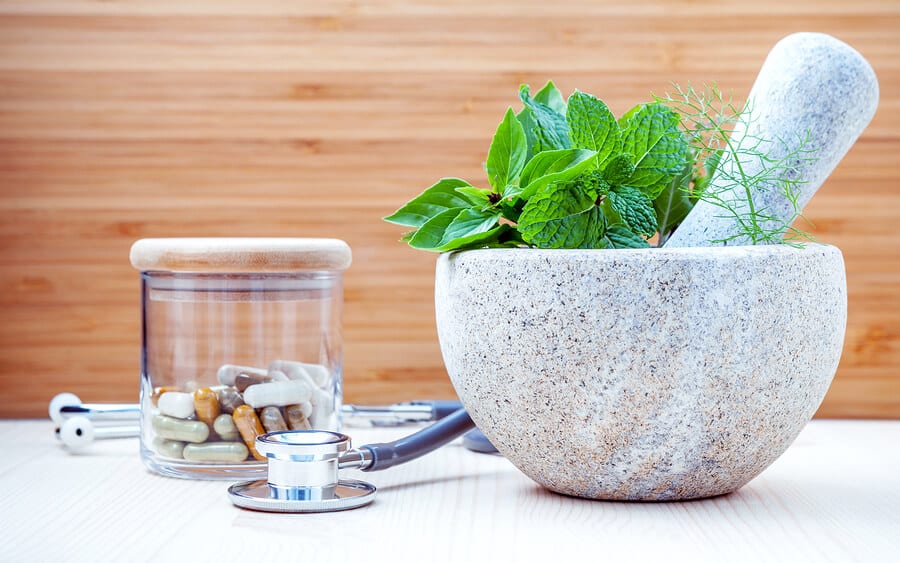
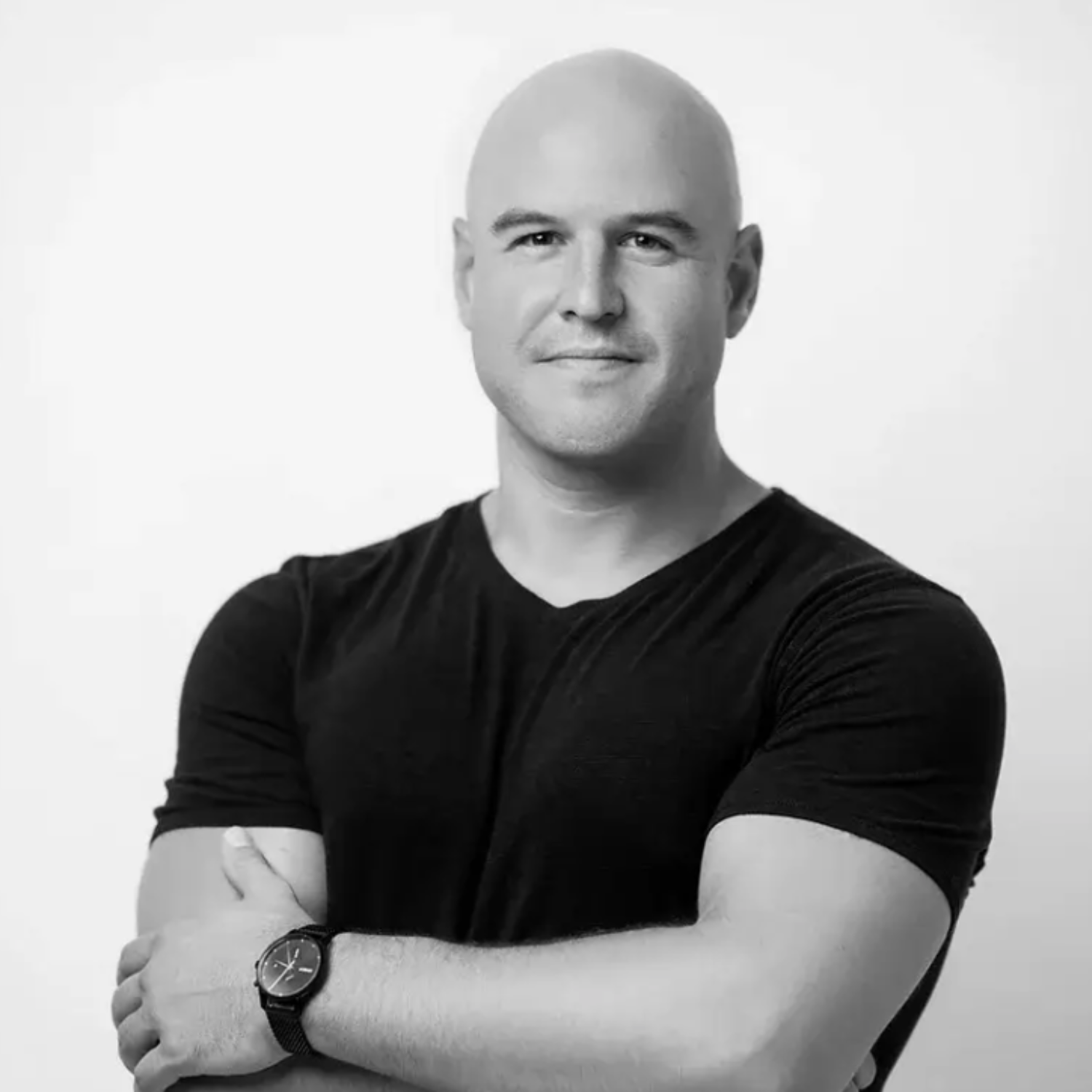





Thank you for the time you took to write all this incredibly helpful and enlightening information that I haven’t found anywhere else.
[…] and serotonin levels in the brain, resulting in improved mood and energy levels. Aim for at least 30–45 minutes of exercise 3–5 times a week. Here are some […]
[…] dependency than acquiring men and women from medications. Take note of your grounds for lowering or stopping alcohol […]
Thank you. I stopped drinking 8 years ago in 2014. I am strong willed. I stopped. I moved forward. I practiced mindfulness. Everything improved. I have zero desire for alcohol. I am 74, I drank for over 50 years.
I am an alcoholic and was sobre two years doing really well with exercise, my mood was fantastic, I slipped for 6 months, managed 6 weeks sobre, I was using valium too and managed a gruesome detox for 6 weeks without any help, 4 days ago I drank 3 bottles of jagermiester over 3 days and now have been in withdrawal for 4 days with no sign of it going away, I’m in bits. I have been using niacin b3 flush which helps a bit, I was chronic for 20 years so my pathways are stubborn and strong. I just… Read more »